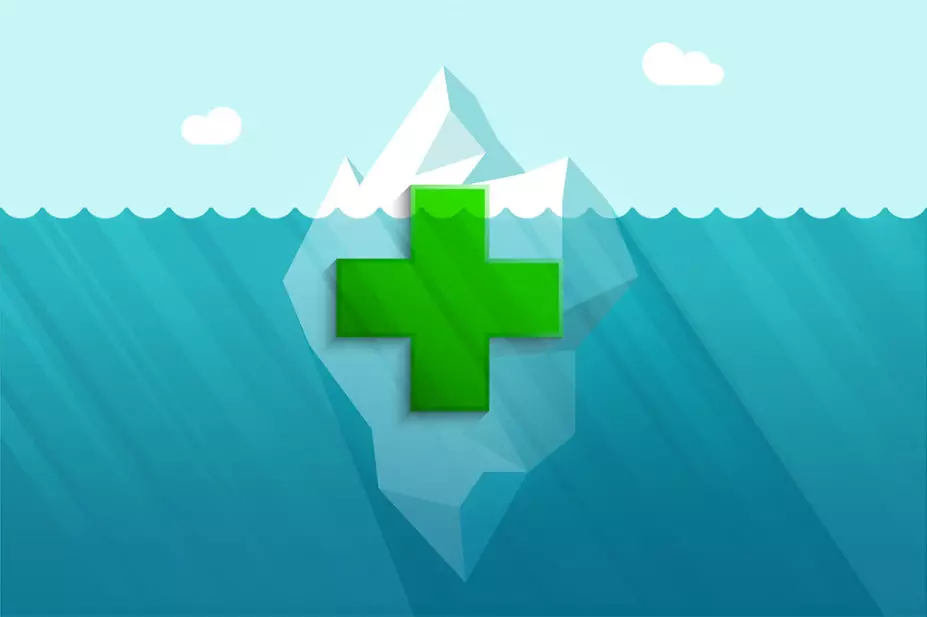
Mclean/Shutterstock.com
Are we conforming to the old stereotype? As pharmacists, we obsess over the details. But we’re missing the bigger picture.
At this moment, fossil fuels are polluting the world around us and destroying our global life-support systems, from our oceans to ozone. But it’s not some far-off problem — we are already feeling the effects in the UK. In south London, as early as 2013, a 9-year-old girl was killed by air pollution from the heavily congested road by her home[1]. And by 2045, the UK is expected to run out of sufficient drinking water, with heatwaves becoming the norm[2].
By 2050, it is expected that what are currently safe hospitals will be sited in flood zones, as well as thousands of homes in places such as Cardiff, Blackpool, Bristol, Kent, London and Suffolk[3]. By that time, as a result of climate change, we will need to care for increased numbers of patients with respiratory, cardiac, infectious and psychological illness — all with a reduced healthcare capacity and a pressurised medicines supply chain[4]. The immense financial impact is estimated to be greater than two world wars and the Great Depression combined, but the outcome in terms of human life and suffering is incalculable[5]. We healthcare professionals must wake up to this.
Where we are now
In 2015, the global mean warming touched 1oC above pre-industrial levels, for the first time, leading the Intergovernmental Panel on Climate Change — a United Nations body — to agree to aim to limit global temperature increases to 1.5oC above pre-industrial levels, to secure life on Earth[6]. But our current 1oC increase already has severe implications: the lethal heatwaves and extreme weather events we are witnessing now are a result of it. The UK government has been warned by the Climate Change Committee to prepare for a rise of at least 4oC[7]. A change of that magnitude, simply, will be a death sentence for billions of men, women and children.
More recently, in February 2021, the chief executive of the Environment Agency warned that the climate emergency is hitting “worst case scenario” levels, which — if left unchecked — will lead to the collapse of entire ecosystems, the onset of international famines and cause the infrastructure that our lifestyles are based on to fail — and this is all set to occur within the next 80–100 years[8,9].
Healthcare contributes to climate change
We must also understand the part we play. Worldwide, the healthcare sector produces around 4.6% of global emissions[10]. Closer to home, healthcare in the UK produces around 5.4% of our total emissions[11].
In 2019, of the 25 megatonnes of carbon dioxide equivalent product by the NHS in England, 62% came from the supply chain — of which 32% related to pharmaceuticals and chemicals[12].
So why has pharmacy as a profession remained largely silent? Back in 2012, individuals such as my colleague Angela Alexander, professor emerita of the University of Reading, called for sustainability to be introduced into the undergraduate curricula, yet, almost ten years later, there is still no broad-sweeping, professional approach to the issue[13].
We are professionally obligated to speak out when something is wrong, but we have ignored the worst health threat in the history of human life on earth. A threat proven by an unimpeachable data set; the evidence that climate change is down to human activity has reached a ‘gold standard’ or ‘five-sigma’ level of certainty — indicating a one-in-a-million chance that this signal would appear if there was no warming[14]. As clinicians who care for patient health, and use evidence-based medicine to do so, we should be driven by this evidence base.
Other professions are standing up
Other healthcare bodies have acknowledged the danger and have spoken out. In June 2019, the British Medical Association declared a “climate emergency” — a declaration acknowledging the urgent action that must be taken to limit the severe effects of climate change[15]. Then, in October 2019, the Royal College of Nursing issued a position statement that “endorses the climate emergency declared by the UK government”, and committed to taking action on the issue on behalf of the profession[16].
This is the kind of clarion leadership we need, much in the same way we needed our health leaders to highlight the dangers of smoking. Those in positions of leadership must be clear about the threat we face, so everyone can fully comprehend it, and the need for action. In the past few years, our medical colleagues have been arrested for undertaking activities to raise the alarm on climate change, and they have even been praised for doing so by the editor of The Lancet, one of the world’s leading medical journals[17]. They understand the threat — do we?
We can mitigate the harms
There is so much we can do. Although the picture may be bleak, we must always hold on to our chance for survival and fight for it. As healthcare professionals, we have an enviable level of social currency and public trust that puts us in a position of great power and potential. If we could lead by example and create a path, others would follow. As a profession, we need to:
- Declare a climate emergency: our leadership bodies must speak out about what is happening and what it will mean to us — and individuals should ask Trusts or employers to do the same;
- Divest from fossil fuels and other environmentally harmful products and companies: our leadership organisations must recognise where portfolio managers are investing in fossil fuels, and this must change — we must understand that these investments will lead to deaths, so we must treat them with the appropriate disdain;
- Provide and advocate for leadership and policies that eliminate climate and ecological harm.
Some may worry what they, alone, can do, but it is crucial that anyone who is remotely ‘climate-conscious’ understands they have a role to play; there’s not a single person too junior or inexperienced to make a difference. If we make concern for the environment part of every conversation, whether it involves medicines directly or not, we will push a wave of momentum to those in charge to thoroughly embed sustainable change.
In the past, humankind has overcome horrors — such as slavery or fascism — previously thought unassailable. To speak up against the norm requires bravery but, morally, the choice is clear.
I believe pharmacy can do it, but where is its voice? We must speak up now.
Tracy Lyons, medicines optimisation pharmacist and pharmacy sustainability lead, Poole Hospital, University Hospitals Dorset NHS Foundation Trust; founder, Pharmacy Declares, @PharmDeclares
- 1Dyer C. Air pollution from road traffic contributed to girl’s death from asthma, coroner concludes. BMJ 2020;:m4902. doi:10.1136/bmj.m4902
- 2England could run short of water within 25 years. The Guardian. 2019.https://www.theguardian.com/environment/2019/mar/18/england-to-run-short-of-water-within-25-years-environment-agency (accessed May 2021).
- 3Map. Climate Central. 2021.https://coastal.climatecentral.org/ (accessed May 2021).
- 4Breaking the fever: sustainability and climate change in the NHS. Royal College of Physicians. 2017.https://www.rcplondon.ac.uk/projects/outputs/breaking-fever-sustainability-and-climate-change-nhs (accessed May 2021).
- 5Stern Review on the Economics of Climate Change. HM Treasury. 2006.https://webarchive.nationalarchives.gov.uk/20100407173719/http://www.hm-treasury.gov.uk/sternreview_index.htm (accessed May 2021).
- 6Global Warming of 1.5 oC. Intergovernmental Panel on Climate Change. 2018.https://www.ipcc.ch/sr15/ (accessed May 2021).
- 7UK Climate Change Risk Assessment 2017 . Department for Environment, Food & Rural Affairs. 2017.https://www.gov.uk/government/publications/uk-climate-change-risk-assessment-2017 (accessed May 2021).
- 8Climate emergency impacts hitting “worst case scenario” levels . Environment Agency. 2021.https://www.gov.uk/government/news/climate-emergency-impacts-hitting-worst-case-scenario-levels (accessed May 2021).
- 9UK Climate Change Risk Assessment 2017 Evidence Report. Climate Change Committee. 2017.www.theccc.org.uk/uk-climate-change-risk-assessment-2017 (accessed May 2021).
- 10Watts N, Amann M, Arnell N, et al. The 2019 report of The Lancet Countdown on health and climate change: ensuring that the health of a child born today is not defined by a changing climate. The Lancet 2019;394:1836–78. doi:10.1016/s0140-6736(19)32596-6
- 11Healthcare’s climate footprint. ARUP. 2019.https://www.arup.com/perspectives/publications/research/section/healthcares-climate-footprint (accessed May 2021).
- 12Tennison I, Roschnik S, Ashby B, et al. Health care’s response to climate change: a carbon footprint assessment of the NHS in England. The Lancet Planetary Health 2021;5:e84–92. doi:10.1016/s2542-5196(20)30271-0
- 13Alexander A. Pharmacists still have time to help mitigate the effects of climate change. The Pharmaceutical Journal. 2012.http://www.pharmaceutical-journal.com/news-and-analysis/news/pharmacists-still-have-time-to-help-mitigate-the-effects-of-climate-change/11108567.article (accessed May 2021).
- 14Evidence for man-made global warming hits ‘gold standard’: scientists. Reuters. 2019.https://www.reuters.com/article/us-climatechange-temperatures-idUSKCN1QE1ZU (accessed May 2021).
- 15Climate change and air pollution. British Medical Association. 2020.https://www.bma.org.uk/what-we-do/population-health/drivers-of-ill-health/climate-change-and-air-pollution (accessed May 2021).
- 16Responding to climate change. Royal College of Nursing. 2019.www.rcn.org.uk/professional-development/publications/pub-007878 (accessed May 2021).
- 17Earls M. Doctors Should Protest Climate Inaction, Top Medical Journal Says. Scientific American. 2019.https://www.scientificamerican.com/article/doctors-should-protest-climate-inaction-top-medical-journal-says/ (accessed May 2021).


